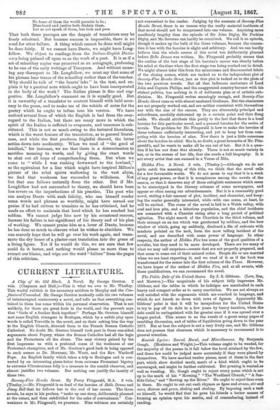Bidden Fire. A Novel. 3 vols. (Tinsley.)—Although we do not
quite catch the meaning of this title, we think that the novel calls for a few favourable words. We do not mean to say that it is a work of any great power, or that it is conspicuous among the novels of, the season, or that it deserves any of those eulogistic sentences which seem to be stereotyped in the literary columns of some newspapers, and appear so often among oar advertisements. But it is a reasonably good novel, uniting a fair amount of plot, incident, and character, and keep- ing the reader generally interested, while .with one scene, at least, he will be excited. The scene of the novel is laid in a Welsh valley, with coal and iron pits, and a laborious population, and the chief incidents are connected with a Chartist rising after a long period of political agitation. The night march of the Chartists in the third volume, and their attempt on an inn which was garrisoned by soldiers, and the bow window of which, going up suddenly, disclosed a file of redcoats with muskets pointed on the mob, form the most telling incident of the novel, and are described with some power of language. In other respects, the author of Bidden Fire has some of the good qualities of a novelist, but they need to be more developed. There are too many of what we may call surprises—events that are not properly prepared, and that seem to come out of their natural order. People die or are married when we are least expecting it, and we read of it as if the book was transformed for the nonce into the first column of the Times. However,. we have hopes of the author • of Hidden Fire, and at all events, with these qualifications, we can recommend the noveL






























 Previous page
Previous page